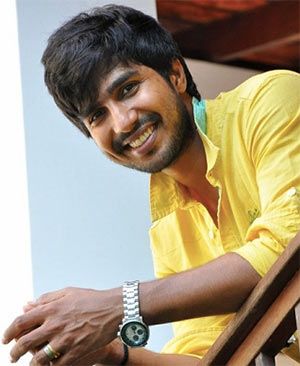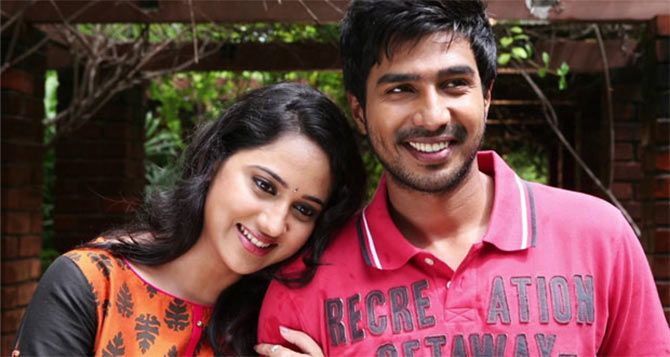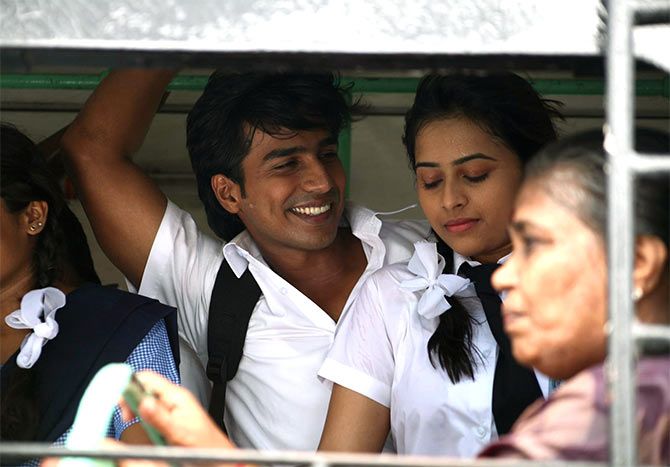 Actor Vishnu Vishal, who made his debut in director Suseenthiran's Vennila Kabadi Kuzhu, in 2009, is slowly but surely making a mark in the Tamil film industry.
Actor Vishnu Vishal, who made his debut in director Suseenthiran's Vennila Kabadi Kuzhu, in 2009, is slowly but surely making a mark in the Tamil film industry.
After two back-to-back hits, Mundasupatti and Jeeva, in 2014, the actor is back with an interesting sci-fi comedy titled Indru Netru Naalai.
The film is directed by newcomer Ravi Kumar, a former associate of Nalan Kumarasamy. The film opened to rave reviews last weekend.
In this interview with S Saraswathi/Rediff.com, an elated Vishnu talks about what it takes to survive in this industry, his gut instinct, and why punch dialogues, fight scenes and hero-entry songs are not his cup of tea.
Two hits in a row last year and great reviews for your latest film, Indru Netru Naalai, how does it feel?
It is very encouraging. I am more confident as an actor now.
It’s good to know that the choices you made have worked. Both Mundasupatti and Jeeva were unique films and I am really glad people liked them.
But Indru Netru Naalai, being a science fiction film, was a totally new concept. We were really worried about how the audience would relate to it.
I’m happy that whatever risk not just I, but the entire team has taken, has paid off so well.
It is surprising how well the audience has connected to the film
How do you manage to get such unique scripts and interesting characters?
When I was offered my first film I was totally inexperienced and had no cinema background. But something told me I would do justice to the role.
It was just gut instinct. I come from a sports background and believed kabadi would be right in my comfort zone!
The film turned out to be even better than we had expected; it was a huge hit.
Then for the next couple of films, I did not go with my gut instinct. I was carried away by other elements, ignoring that voice inside.
The films failed, and I sat down to analyse what went wrong.
I decided that unless I was certain about the character, until I don't get that feeling from inside, I will not accept a film, even at the risk of sitting idle.
It was a tough call and also a huge risk. After all, in this industry if you are out of circulation for a couple of years, people will stop coming to you.
But I was determined. I rejected 11 scripts before I got the opportunity in Seenu Ramasamy's Neerparavai, in 2012.
What got you interested in Indru Netru Naalai?

When things begin to go your way, you get more confident. You start believing in yourself. After the success of Mundasupatti and Jeeva, I had a certain confidence.
When I first heard the story of Indru Netru Naalai, I was quite intrigued. This was a film I would love to do.
My only fear was whether people would be able to relate to the subject. But my instincts had never let me down before.
I had survived on unusual films. So I decided to take up the challenge.
Once we started shooting, I became more confident. Director Ravi Kumar was doing a great job and I knew we had a good film on our hands.
Eventually, whether a film will be a hit or not, no one can predict. But we can definitely sense how a film is shaping up.
What do you think works for a film? Is it the script, the director or the banner?
I believe it is a combination of all three. A director may have a wonderful script, but how he brings his vision and words to life on the big screen is important.
If not executed properly, the most brilliant screenplay can end up as a disaster. And this is my personal experience. Sometimes the director can narrate the most amazing script, but the film can still end up being a failure.
Having the right producer to back your film is equally important. After all the hard work, if the film ends up in the hands of the wrong producer, it may never see the light of day. It is sad how many great films are lying unreleased because of financial problems.
That is not all. You need the right set of actors and technicians too.
Today everything needs to be perfect, only then the audience will come and watch your film in the theatres.
Does it bother you that in most of your films you have to share the spotlight with so many other supporting characters?
Not at all. I never worry about other characters sharing equal screen space or even overshadowing me in a film.
I knew that the audience was going to love the character of Muniskanth (played by Ramdoss) in Mundasupatti. He was doing such a fantastic job. I became a huge fan myself.
I’m very happy when someone who has worked with me does well and is appreciated.
It is important to work together as a team, complement and encourage each other. Ultimately, we are all her to survive, we should take pride in each other's achievements.
What is important is that the film does well.

Do you deliberately stay away from punch dialogues, fight sequences and hero-entry songs?
(Laughs) Actually there is this scene in Indru Netru Naalai, where I have to swagger into an important board meeting and talk about the share market.
I was hesitant to do the scene. I told the director that I had never done such over-the-top scenes before. But he insisted, so I went ahead.
But I am aware that any such mistake can cost me my career. After my second and third films failed, I realised that I had to be very careful in my choice of films.
Not everyone will be accepted as a mass hero. I think it is that fear that has kept me grounded and helped me survive.
I just want to continue doing good films. But the producer should at least break even.
Tell us about working with Karunakaran.
Karunakaran is a very good actor. I love his brand of acting.
We get along really well. I think this off screen friendship and comfort is reflected on the screen.
I believe there is a very thin line between comedy and making people laugh without hurting anyone’s feelings.
Comedy can easily become hurtful and cause pain. This is true even in real life.
Karunakaran's brand of humour does not come at the expense of others. He can make you laugh even in the most serious situation, with just an ordinary dialogue.
Whatever he says and the way he says it, ends up becoming totally funny. He has done a fabulous job in the film. I laughed so much while shooting with him.
Looking back at your career, do you still miss cricket? Any regrets?
The luckiest thing that happened in my life was the CCL (Celebrity Cricket League). At the time, just when I was missing cricket, the CCL was launched.
My dream of playing before screaming crowds in venues across the country was fulfilled; it was an unbelievable feeling.
There was a time in my life when cricket was my goal, my dream. Today cinema is my life.
It is truly a blessing that I have had the opportunity to experience both worlds.
So looking back, I have no regrets.
I regret the choice of some of my earlier films. But even that has taught me something.
I think every failure in your life makes you a better person. What is important is that you don't repeat the same mistakes.











 © 2025
© 2025